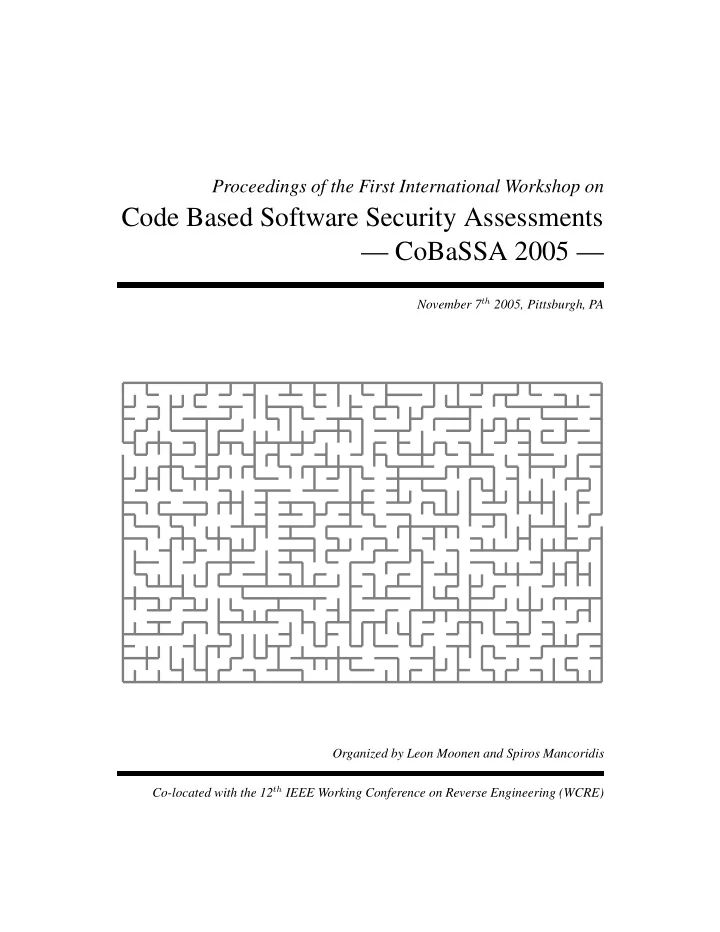

Proceedings of the First International Workshop on Code Based Software Security Assessments — CoBaSSA 2005 — November 7 th 2005, Pittsburgh, PA Organized by Leon Moonen and Spiros Mancoridis Co-located with the 12 th IEEE Working Conference on Reverse Engineering (WCRE)
Proceedings of the First International Workshop on Code Based Software Security Assessments CoBaSSA 2005 ii
Proceedings of the First International Workshop on Code Based Software Security Assessments CoBaSSA 2005 Contents Code Based Software Security Assessments 1 Schedule 3 Pattern Matching Security Properties of Code using Dependence Graphs by John Wilander & Pia F˚ ak 5 Hardware-based Control Flow Monitoring to Prevent Malicious Control Flow Redirection by Nidhi Shah & Linda M. Wills 9 Towards Disk-Level Malware Detection by Nathanael Paul, Sudhanva Gurumurthi & David Evans 13 Adversarial Software Analysis: Challenges and Research by Andrew Walenstein & Arun Lakhotia 17 CoBaSSA Working Session 21 iii
Proceedings of the First International Workshop on Code Based Software Security Assessments CoBaSSA 2005 iv
Proceedings of the First International Workshop on Code Based Software Security Assessments CoBaSSA 2005 Workshop on Code Based Software Security Assessments Background Our technological society has become more and more dependent on software that is used to automate everyday processes. This dependence increasingly exposes us to the secu- rity threats that originate from malicious software (malware) such as computer viruses and worms and software vulnerability exploits such as remote execution of code or denial of service attacks. Moreover, this exposure is not limited to computer systems but is spread- ing to common appliances such as mobile phones, PDAs and consumer electronics such as media centers, personal video recorders, etc. since a growing number of these products are made extensible and adaptable by means of embedded software. The proliferation of malware and exploits requires that action is taken to tackle these issues and evaluate software security to prevent the damage and costs (e.g., data loss, pro- ductivity loss, recovery time) that result from security incidents. This calls for measures to assure that a software system has the desired security properties, i.e. that it is free of malware and vulnerabilities. Objectives The purpose of this workshop is to bring together practitioners, researchers, academics, and students to discuss the state-of-the-art of software security assessments based on reverse engineering of source or binary code (as oppposed to software security assessments that look at the software proces that was applied). This includes research on topics like source & binary code analysis techniques for the detection of software vulnerabilities (e.g. detect if code has potential buffer overflow problems) or analysis for the detection of malicious behaviour (e.g. detect if code contains exploit/virus/worm). Page 1
Proceedings of the First International Workshop on Code Based Software Security Assessments CoBaSSA 2005 Topics of interest CoBaSSA topics of interest include, but are not limited to: • Mitigating stack- or heap-based buffer overflow attacks • Re-modularizing legacy code for privilege separation • Code tamper-proofing and obfuscation • Detecting vulnerabilities in trust management and authentication • Best practices practices for secure coding • Analysis of computer virus and worm code • Case studies analyzing system software vulnerability (e.g., CORBA, EJB, DCOM, Windows, Linux) • Binary code disassembly and anti-debugging • Race condition detection • Copy protection schemes • Analysis of the implementation of cryptographic algorithms Dissemination of results All accepted position papers are available in digital proceedings from the workshop’s web- page: http://swerl.tudelft.nl/leon/cobassa2005/ The workshop’s results will be summarized in a workshop report that will also be available from this website. Workshop Organizers CoBaSSA 2005 is organized by: • Leon Moonen (Delft University of Technology & CWI, The Netherlands) � Leon.Moonen@computer.org � • Spiros Mancoridis (Drexel University, USA) � spiros@drexel.edu � Page 2
Proceedings of the First International Workshop on Code Based Software Security Assessments CoBaSSA 2005 Schedule During the workshop, we will have five 30 min presentations, each followed by 10 minutes for questions and discussion. In the afternoon, we will have a longer working/discussion session to establish a list of open issues in software security assesment research and prac- tice . Participants are asked to prepare for the latter by thinking up their own top 3 of open issues before the workshop. 8:30 Opening & participants introduce themselves 9:00 Presentation: Pattern Matching Security Properties of Code using Dependence Graphs by John Wilander & Pia F˚ ak. 9:30 Questions & Discussion 9:40 Presentation: Hardware-based Control Flow Monitoring to Prevent Malicious Control Flow Redirection by Nidhi Shah & Linda M. Wills 10:10 Questions & Discussion 10:20 Coffee break 10:40 Presentation: Towards Disk-Level Malware Detection by Nathanael Paul, Sud- hanva Gurumurthi & David Evans 11:10 Questions & Discussion 11:20 Presentation: Adversarial Software Analysis: Challenges and Research by An- drew Walenstein & Arun Lakhotia 11:50 Questions & Discussion 12:00 Lunch 13:00 Invited Presentation: Best practices for secure coding by Robert C. Seacord. 13:30 Questions & Discussion 13:40 Working session “Open issues in software security assesments” 15:10 Coffee break 15:30 Wrap up & conclusions: lessons learned, next steps. 16:00 (workshop ends) Page 3
Proceedings of the First International Workshop on Code Based Software Security Assessments CoBaSSA 2005 Page 4
Recommend
More recommend